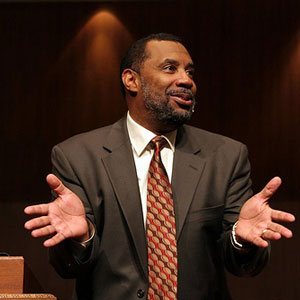What you think about all day can determine how you live. Our thoughts tend to produce certain actions, and it’s an ancient truth as old as the Garden of Eden.
Imagine, for example, you are Adam or Eve before the fall. As we know from Genesis 3, the conversations and thoughts during this time before they disobeyed God were mostly about the rules.
“What did God really say?”
“Why are some fruits allowed and some are off-limits?”
“Will we really die if we eat from the tree of knowledge?”
Before Adm and Eve sinned, they started questioning. The thoughts inside their head were not evil but they led to an evil action (disobedience). Most sinful actions start with a decision in our minds. As we know from James 1:15a: “When desire has conceived, it gives birth to sin.”
For Adam and Eve it was as though a tape kept playing over and over again, making them question everything God had already told them and made abundantly clear.
These days, we all struggle with those same tapes playing inside our heads. We hit rewind and think about the mistakes in our marriage. We relive moments at work when we acted abrasively. We look back to a childhood experience when we didn’t look out for a friend at school.
Sometimes, these tapes are audible – because we say them out loud. We talk about failures from decades ago as if they happened last week. We repeat stories about mistakes we’ve made in conversation that do not bear repeating. The question to ask, is why do we do that?
One expert has the answer. Bestselling author Jon Acuff released his book “Soundtracks: The Surprising Solution to Overthinking” recently, and it’s about why we replay those tapes inside our heads and repeat them to ourselves. Acuff addresses a common ailment: telling ourselves half-truths and misconceptions that lead to depression, anger, and even self-loathing at times. Worse, these tapes often lead to actions like staying in the same dead-end job, criticizing others and fault-finding, and making poor decisions.
It doesn’t have to be that way. Acuff does an excellent job recalibrating the act of overthinking, turning it on its head. He offers a solution to overthinking where you play a different soundtrack. Instead of believing lies, acting on impulses derived from false information, he suggests a three-step process:
- Retire your broken soundtracks
- Replace them with new ones
- Repeat them until they’re as automatic as the old ones
By focusing on your soundtrack, the author says you can repeat truth and inspiration to yourself. You can refocus and recalibrate on things that are worth your attention, starting with your own thoughts that lead to better and more productive actions, the kind that leads to a healthier life.
The first step, he says, is to accept that your soundtrack is broken.
One example he gives in the book Soundtracks which hit home for me, is when he went to do some writing at a coffee shop. He recounted how the soundtrack he was playing as shallow and trite.
The table where he usually sits was occupied, so he kept telling himself lies about not being productive. “If you sit by that guy talking on the phone you won’t get anything done.” The tape kept telling him he would not be able to finish his tasks if he didn’t sit in a favorite spot. In the end, Acuff explains how the tape even told him he probably wasn’t going to write another book anyway.
I can relate to that. As a book author myself, I know it’s easy to get side-tracked. Over the last 20 years, I’ve become a prolific writer, having published several thousand articles and one previous book. Yet, it seems to be endemic to all writers that this self-questioning occurs. My tape tends to play a soundtrack about not having ideas that are worthwhile or writing in a way that is not engaging enough.
How about you? What tapes are playing inside your head?
Acuff does an excellent job in Soundtracks of challenging our thought patterns. After we start realizing we have a broken soundtrack, that we are letting our negative thoughts control our behavior and what we say to others, we can start doing the hard work of loading new thoughts. This starts with what we do each day. In my case, because I’m writing a book about following productivity routines to develop good habits, I start with a morning routine writing in a journal. I’m calibrating my thoughts, one day at a time.
The reason I do that is because I need to set the tone for a productive thought process. Reading the Soundtracks book helped me understand how my thoughts lead to actions, good or bad. It starts with what we tell ourselves, and we’re often our own worst critics.
Acuff is a funny guy, and some of his stories in Soundtracks are engaging and memorable. My favorite is a quick story about how a famous rapper who had to start believing his work was worthwhile. The challenge for most of us is jumpstarting those new thoughts. It’s as though our brains are wired to think about the bad experiences we’ve had and to dwell on them. We need to rewire those thoughts.
For most of us, the recalibrating process should start with Scripture. One of the reasons memorizing verses is so key to spiritual growth is that it puts those thoughts inside our heads where they hopefully lodge for many years or even decades. I still know the verses I memorized in college, shortly after becoming a Christian. When we are tempted to think about our mistakes and dwell on failures, we can play the only tapes that really matter – the ones that God inspired in the Bible.
This is especially valuable during dark times. Fighting against negative thoughts about the economy, or the pandemic lingering, or family struggles. Not accepting the truth of Scripture, as it says in Psalms 139:14, that you are fearfully and wonderfully made, means accepting a false narrative.
In dark times, it is best to find a reason to expose the light. Starting with Scripture and then recalibrating daily thoughts about who God has made you to be – and who you will become.
So here’s a challenge today. Will you consider a recalibrating process? Pick just one verse and load that into your memory banks where you can hit play anytime you want. If you do accept this challenge, feel free to drop me a note.
John Brandon currently serves as the Digital Media Director at Northwestern Media. He is a well-known journalist who has published over 15,000 articles on social media, technology, leadership, mentoring, and many other topics.










